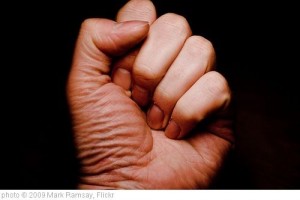Don't Be Afraid to Pray Honestly. God Can Take It.
At the 9:30 Sunday service a few weeks ago, we read Psalm 137 aloud. This psalm is a lament about God's people being exiled in Babylon, forced to sing for their captors. The opening line is familiar to many of us: "By the waters of Babylon, we sat down and wept when we remembered Zion." It goes downhill from there, ending with an earnest plea for God to vindicate God's people and allow them to dash the heads of their captors' infants against rocks. Yes, we were asked to read those lines in unison. Out loud. In church.
Awkward.
I'll never be convinced that Psalm 137 is an appropriate read-aloud for worship. But as a guide for how our private prayers might go? Psalm 137, and all of the other Psalms, might actually have something important to teach us.
As Curtis wrote that same week about Psalm 137, "What do we do with passages like these when we hear them in church or read them in our daily devotions?...We can first take them for what they are, namely, honest expressions of raw emotions deeply felt by people who struggled to believe that God was somehow connected to them, despite all of the horribleness." I'd like to go a little bit further with this idea that Curtis introduced.
The Psalms are remarkable because, above all, they are human and honest. They rip away the socially acceptable masks we like to wear, revealing our deepest human emotions. Including the desire for revenge—sometimes violent revenge—against those who have wronged us. Including despair. Including moments in which transcendent beauty move us to spontaneous praise of God and the world God created.
 The Psalms don't speak for God. Our God does not want babies killed on rocks. Our God doesn't want us weeping, sleepless, on our beds. Our God doesn't want us to be unable to see or believe or connect with God because we are so immersed in darkness, within our without. But don't we all find ourselves in one—or all—of those places at different times in our lives? Wanting to hurt those who have hurt us? Unable to sleep because worry or sadness overwhelms? Wanting to hope but unable to find anything in which to hope? The Psalms don't speak for God; they speak for us.
The Psalms don't speak for God. Our God does not want babies killed on rocks. Our God doesn't want us weeping, sleepless, on our beds. Our God doesn't want us to be unable to see or believe or connect with God because we are so immersed in darkness, within our without. But don't we all find ourselves in one—or all—of those places at different times in our lives? Wanting to hurt those who have hurt us? Unable to sleep because worry or sadness overwhelms? Wanting to hope but unable to find anything in which to hope? The Psalms don't speak for God; they speak for us.
My friend Rachel Stone, a writer and blogger like me, recently wrote about how timid and whitewashed our modern prayers are compared with the Psalms. We hesitate to ask God—to demand from God—what we desperately need, such as healing, hope, or rescue. We couch our prayers in qualifiers. We ask God to help us cope rather than asking God to fix it. "But," Rachel asks, "what if the Bible suggests that complaining to God about how things are is actually okay–more than okay, really? I mean, why else do we pray for God’s will to be done on earth as it is in heaven if we aren’t, in fact, pretty sick of how things are going on earth?"
I encourage you to go read Rachel's entire post, which is short and includes her trademark stick figures. And then think about why, how, and when we pray. I'm not encouraging anyone to wish their enemies' children dead, but I think it's okay to let God know when our hurt, worry, or hopelessness are so big that we can no longer speak in polite, or even complete, sentences.
I find it pretty easy to say prayers of gratitude throughout the day. But reading Rachel's post made me realize how infrequently I beg God for help or tell God just how I feel about the editor who rejected my work. Or the bullying incident one of my children tells me about. Or the childhood friend coping for years with a serious mental illness. Or Syria.
We can trust God with our deepest, most shameful, most unpleasant, most out of control thoughts and feelings. God can take it.
Ellen Painter Dollar is a professional writer and member of St. James’s Episcopal Church. She blogs for St. James’s every Monday, offering reflections on current events, family life, and parish life.
